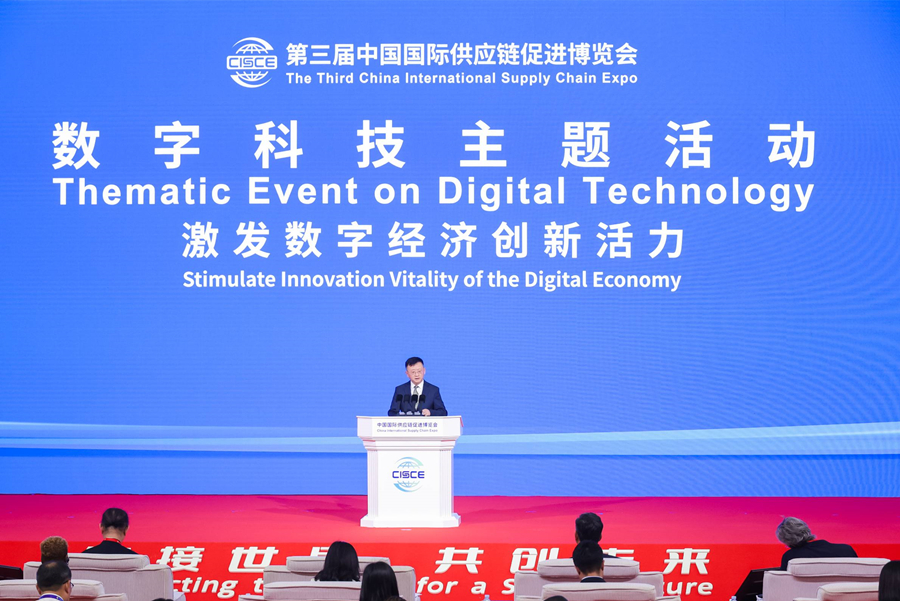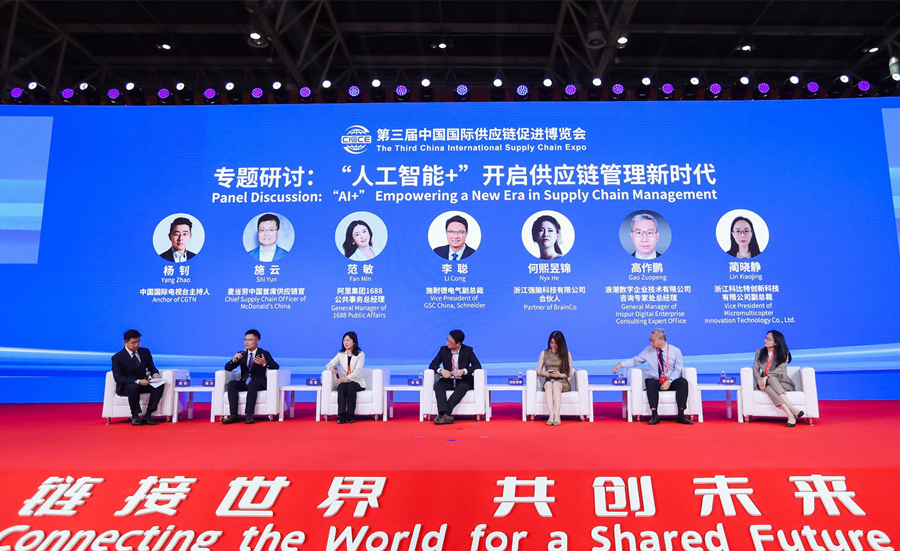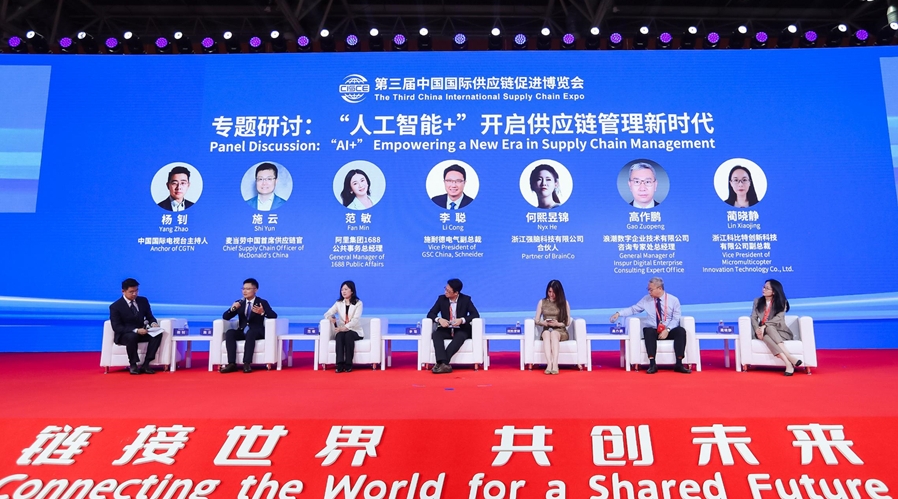A thematic event on digital technology was held on July 18 in Beijing during the 3rd China International Supply Chain Expo (CISCE), with participants discussing the theme "Stimulating Innovation Vitality in the Digital Economy."

Nie Wenhui, vice chairman of the CCPIT, speaks at a thematic event on digital technology during the 3rd CISCE in Beijing, July 18, 2025. [Photo courtesy of the CISCE Organizing Committee]
The Global Supply Chain Promotion Report, released by the China Council for the Promotion of International Trade (CCPIT) on July 16, indicates that the digital economy will emerge as a new driver of economic globalization, while digital transformation has become a new competitive frontier for upgrading industrial and supply chains.
Nie Wenhui, vice chairman of the CCPIT, stated at the event that digital technologies and the digital economy have become focal points in the latest round of international competition and key variables reshaping the global economic landscape.
He noted that the Digital Technology Chain exhibition area at the 3rd CISCE combines scenario-based demonstrations with immersive interactive experiences, showcasing global supply chain integration across three dimensions — foundational technological innovations, mid-stream industrial incubation, and end-user application scenarios in the digital economy.
"We encourage all parties to fully leverage the CISCE platform to enhance industrial chain connectivity, foster collaboration among enterprises of all sizes, strengthen industry-university-research-application synergies and facilitate China-global corporate engagement in the digital economy," Nie emphasized.
"China possesses abundant data resources, a complete industrial ecosystem, vast market potential and strong momentum in digital economy development," he said, noting continuous improvements in network infrastructure, computing power and application support systems. "The international competitiveness of China's platform economy continues to rise, particularly through AI's significantly increased penetration across all corporate supply chain segments. Research indicates AI could boost global GDP by 15% by 2035."
In 2024, China's core digital economy industries contributed approximately 10% of GDP, with the information transmission, software and IT services sector growing 10% year on year. Meanwhile, cross-border e-commerce exports totaled 2.15 trillion yuan ($300 billion), marking 16.9% growth over 2023.
Later in-depth panel discussions addressed two major themes: "'AI+' Empowering a New Era in Supply Chain Management" and "Digital Economy Cooperation — A Key Path to Shared Benefits in the Age of Intelligence."
Shi Yun, chief supply chain officer of McDonald's China, said AI provides "smart wings" for end-to-end supply chains. "With AI, we can now consolidate data across the entire supply chain, using AI-driven methods to boost efficiency and unlock growth opportunities," he said. "This represents a major opportunity for supply chain development."
Fan Min, general manager of public affairs at Alibaba 1688, said she personally believes AI significantly improves efficiency in supply-demand matching across supply chains. She explained: "1688 currently serves 1.08 million suppliers, including nearly 600,000 small and medium-sized manufacturers. We're continuously exploring how to help SMEs ride this wave of AI advancement and fully reap its benefits."

Executives take part in a panel discussion during a digital technology thematic event at the 3rd CISCE in Beijing, July 18, 2025. [Photo: CISCE Organizing Committee]
Li Cong, vice president of GSC China at Schneider, emphasized that the fundamental nature of supply chains remains unchanged regardless of technological advancements. "AI's most significant impact lies in enabling predictive management and optimizing efficiency across future operations and the entire manufacturing process," he said. "Regarding resilience, we now see it evolving in manufacturing into the capacity for rapid recovery and reconfiguration. This represents AI's most transformative potential for supply chain configuration."
Nyx He, partner at BrainCo and a pioneer in non-invasive brain-computer interface (BCI) technology, stated that BCI represents foundational AI applications through neural signal decoding. She explained that the technology can transform supply chains by enabling brain-controlled robotics for warehousing, transportation and hazardous environment operations — replacing manual labor with safe, efficient automation. She emphasized that their supply chain model requires deep collaboration with manufacturers to develop fully customized components, creating mutual growth opportunities through advanced technical requirements.
Gao Zuopeng, general manager of Inspur Digital Enterprise Consulting Expert Office, outlined how AI is transforming supply chain management. He explained that digital supply chain systems can leverage AI to enhance operations through real-time monitoring, predictive demand forecasting and dynamic disruption response. As supply chain anchors, mid-to-large enterprises should develop end-to-end digital collaboration platforms, creating transparent mirrored networks that connect all partners across procurement, production and sales cycles.
Lin Xiaojing, vice president of drone manufacturer MicroMulticopter Innovation Technology Co. Ltd., stated that manufacturing enterprises must balance supply chain control with timely delivery. "We believe AI's core transformation will occur in supply chain decision-making — avoiding waste while ensuring on-time delivery. In terms of efficiency, AI will uniquely enable supply chains to achieve both operational efficiency and resilience," she said.
The thematic event on digital technology, hosted by the China Chamber of International Commerce, brought together over 400 participants including representatives from international organizations, business associations, academic experts and corporate leaders from Chinese and global enterprises.


 Share:
Share: 




 京公網(wǎng)安備 11010802027341號(hào)
京公網(wǎng)安備 11010802027341號(hào)